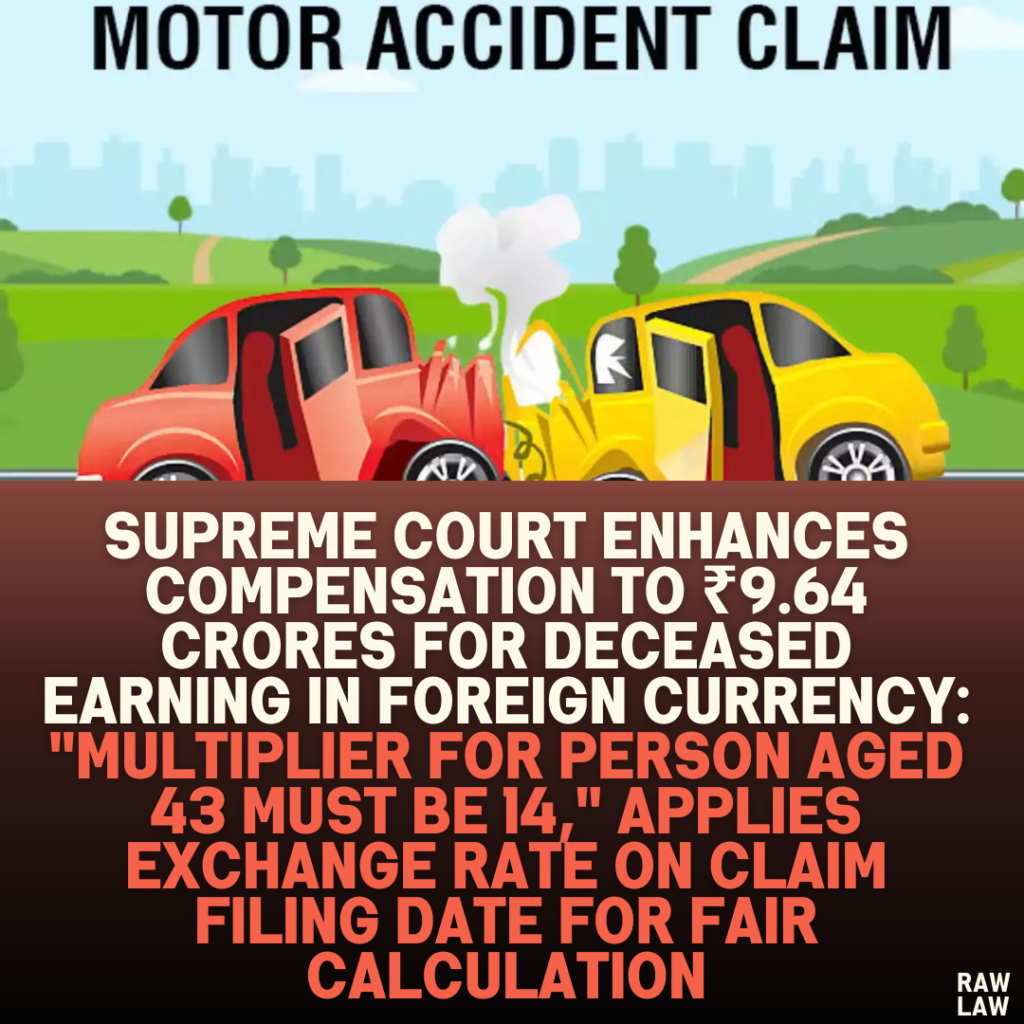Court’s Decision
The Supreme Court allowed the civil appeal filed by the dependents of the deceased and overturned the High Court’s decision to reduce the compensation amount. It restored the amount awarded by the Motor Accident Claims Tribunal (MACT) with modifications, resulting in total compensation of ₹9,64,52,220 along with 7.5% annual interest. The Court reaffirmed the following principles:
- Multiplier: For a person aged 43, the correct multiplier is 14 as per the precedent set in National Insurance Co. Ltd. v. Pranay Sethi.
- Exchange Rate: The rate of currency exchange to be applied is the one prevailing on the date of filing the claim petition, as per Jiju Kuruvila v. Kunjujamma Mohan.
Facts
- Accident and Claim:
- The deceased, aged 43, was a U.S. resident and highly educated, holding a Master’s degree in Computer Science. She worked as a software engineer earning $11,600 monthly and was also a real estate commission salesperson in Georgia, USA.
- She was traveling in a Honda City car with her family when a bus owned by the Andhra Pradesh State Road Transport Corporation collided with the vehicle due to rash and negligent driving, causing her death on the spot and injuring the occupants.
- Compensation Claims and Tribunal Decision:
- Her dependents (husband and daughters) filed a compensation claim for ₹9 crore before the Motor Accident Claims Tribunal (MACT), citing her substantial income in U.S. dollars.
- The MACT awarded ₹8,05,77,476 based on her monthly income, after tax deductions and applying future prospects at 30%, using a multiplier of 14 for her age group, and adding ₹2,35,000 for conventional heads.
- High Court Appeal:
- The Transport Corporation appealed to the High Court, disputing the findings of rash and negligent driving, the application of the multiplier, and the overall compensation amount.
- The High Court upheld the deceased’s monthly income of $11,600 but reduced the multiplier from 14 to 10, citing foreign earnings, and awarded ₹5,75,68,982.
Issues
The Court identified two main issues:
- Whether the applicable exchange rate for converting foreign income should be as of the accident date or the filing date of the claim petition.
- Whether the High Court was justified in reducing the multiplier from 14 to 10 for the deceased, who was earning in foreign currency.
Petitioner’s Arguments
- Multiplier Issue:
- The petitioners argued that the deceased’s age group (41–45) mandates a multiplier of 14 under settled law (Pranay Sethi), and the High Court erred in reducing it.
- They further submitted that foreign earnings do not justify a deviation from the standard multiplier.
- Exchange Rate:
- The exchange rate prevailing at the time of filing the claim petition (₹57/USD) should apply for calculating the total compensation.
- This principle was settled in Jiju Kuruvila v. Kunjujamma Mohan, ensuring uniformity and fairness.
Respondent’s Arguments
Despite being served, the respondents (Andhra Pradesh State Transport Corporation) did not make an appearance or contest the appeal before the Supreme Court.
Analysis of the Law
- Multiplier Application:
- The Court relied on National Insurance Co. Ltd. v. Pranay Sethi (2017), which established that the multiplier for a deceased aged 43 must be 14. No exceptions were made for individuals earning in foreign currency.
- The High Court’s reduction of the multiplier was therefore found to be contrary to established precedents.
- Exchange Rate for Conversion:
- The Court referred to Jiju Kuruvila v. Kunjujamma Mohan (2013), which held that the rate of exchange to calculate compensation should be the one prevailing on the date of filing the claim petition.
- Following this, the exchange rate was fixed at ₹57/USD, which was applicable at the time of the claim petition’s filing in 2012.
- Future Prospects and Dependency:
- As per Pranay Sethi, the deceased’s future prospects were calculated at 30% of her monthly income.
- After deducting one-third of her income for personal expenses, the final annual income was multiplied by 14, considering her age and dependency of three family members.
Precedent Analysis
- National Insurance Co. Ltd. v. Pranay Sethi (2017): Established guidelines for calculating compensation, including the multiplier method and future prospects.
- Jiju Kuruvila v. Kunjujamma Mohan (2013): Held that the exchange rate for foreign earnings should be based on the rate prevailing at the time of filing the claim petition.
- United India Insurance Co. Ltd. v. Patrica Jean Mahajan (2002): Addressed the treatment of foreign earnings in compensation claims but distinguished in the present case.
Court’s Reasoning
The Court emphasized two key points:
- Multiplier Application: The High Court’s reasoning for reducing the multiplier due to foreign earnings lacked merit and contradicted settled law. The multiplier of 14 was deemed appropriate for a person aged 43.
- Exchange Rate: Adopting the exchange rate as of the filing date ensures fairness and aligns with previous rulings.
By restoring the higher compensation amount, the Court ensured justice for the dependents of the deceased, considering her significant contribution to her family.
Conclusion
The Supreme Court allowed the appeal, recalculating the compensation at ₹9,64,52,220, inclusive of ₹96,890 for loss of consortium, ₹18,150 for funeral expenses, and ₹18,150 for loss of estate. Interest at 7.5% per annum, as awarded by the MACT, was upheld.
Implications
This judgment reaffirms the principles for calculating compensation in motor accident cases, particularly when the deceased earns in foreign currency. It ensures consistency in the application of the multiplier method and clarity on the applicable exchange rate, offering a more predictable framework for such claims.




Pingback: Supreme Court Dismisses Petition Alleging Humiliation in Open Court; Holds Habeas Corpus Petition Became Infructuous After Missing Mother Returned Home and Clarifies Scope of Judicial Proceedings - Raw Law